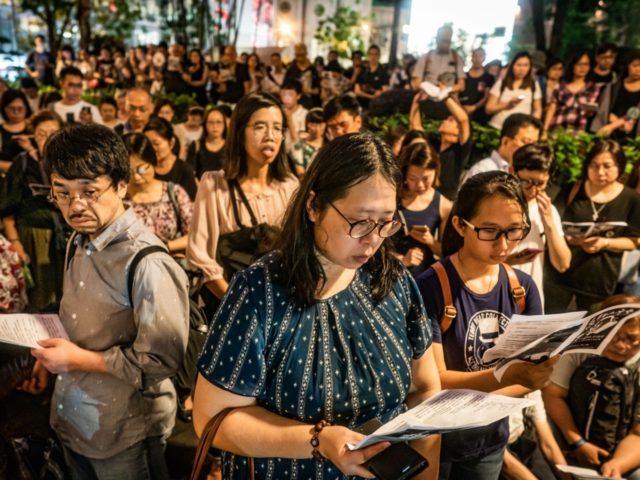Hong Kong demonstrators have adopted “Sing Hallelujah to the Lord” as their unofficial anthem, singing it constantly as they march before the legislative headquarters and demand a permanent end to the recently suspended extradition bill.
Democracy activists and protest organizers vowed on Wednesday to keep the massive demonstrations going until the government irrevocably withdraws the bill and chief city executive Carrie Lam steps down.
Fox News noted on Tuesday that only ten percent of Hong Kong’s population is Christian, but “Sing Hallelujah to the Lord” quickly caught on as an anthem after church groups rallied to protect demonstrators against police brutality.
The song proved easy to learn, enjoyable to sing, calming to hear, and highly advantageous for signaling the peaceful nature of the demonstrations.
“Stop Using Baton Or We Sing Hallelujah to the Lord,” read one of the signs carried by protesters, a reference to police using batons to beat them.
Some of the singers noted that Carrie Lam is Catholic, so they hoped the song would send a message to the city’s top official. Others pointed to Hong Kong’s far greater commitment to religious freedom than mainland China and sang the hymn to highlight the difference between the two systems. Hong Kong regulations are also much less stringent for religious assemblies than political protests.
Activists on Wednesday reaffirmed their determination to continue demonstrating until the extradition bill is utterly defeated and Lam resigns.
“More demonstrations and resistance will happen soon if Carrie Lam does not know what respect means,” promised Joshua Wong, the young democracy activist and veteran of the 2014 Umbrella Movement released from prison just as Lam caved in and suspended hearings on the extradition bill.
Wong said the new protest movement has been more successful than the Umbrella Movement was because it has a more organic “leaderless model,” making it difficult for the pro-Beijing government to “target any representative, icon, or leader.”
Other activists were concerned this very same “leaderless model” could make it difficult to keep the movement going now that the extradition bill is effectively off the table, with Lam and other top officials signaling extreme reluctance to revive it.
Another prominent activist leader, legislator Claudia Mo, argued the demonstrators should push for changes to city government that would not only unseat Lam but make it more difficult for future leaders to obey Beijing while ignoring the people. Paramount among these changes would be the direct election of city executives, a reform Beijing fiercely opposes.
“This goes back to the Umbrella Movement, that’s what it’s all about: the election, not selection, of the Chief Executive. She cannot be ousted from the office by the people as such, she can only be ousted by Beijing, her big boss,” said Mo.
“The people are still mad as hell,” said Ray Chen, another opposition lawmaker. “People will take to the streets again in massive numbers and keep enormous pressure on the government until Carrie Lam steps down and the extradition to China bill is completely withdrawn.”
Some observers think the victorious demonstrators could set their sights even higher. Gordon Chang, author of The Coming Collapse of China, looked upon the Hong Kong protests in a Fox News column on Wednesday and saw a chance for the entire “hardline political system” of China to come crashing down.
Chang took note of the same “leaderless movement” phenomenon highlighted by Joshua Wong and said it could defeat mainland China’s usual propaganda about agitators serving as puppets for hostile foreign nations seeking to destabilize Communist society. He saw the propaganda wall cracking already, with information about the Hong Kong protests leaking into China despite furious censorship efforts by the Communist Party, prompting tough questions about Chinese President Xi Jinping’s leadership.
“What Chinese censors desperately want to prevent is not just news that people can demonstrate, but that they can get what they want,” wrote Chang. If the people of Hong Kong get anything else they want, from a humiliating permanent defeat of the extradition bill to Lam’s resignation or the installation of representative democracy, it could begin an avalanche of resistance that rumbles all the way to Beijing.

COMMENTS
Please let us know if you're having issues with commenting.